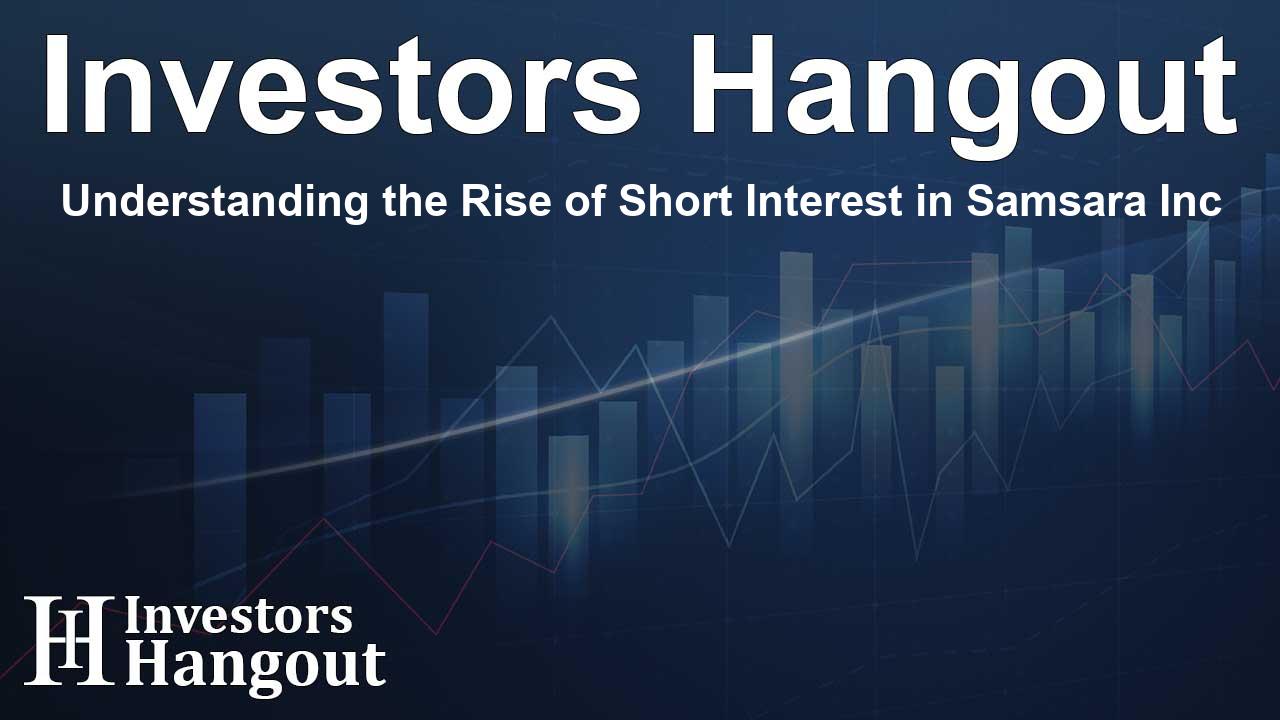Understanding the Rise of Short Interest in Samsara Inc

Examining Samsara’s Increasing Short Interest
Samsara Inc (NYSE: IOT) has recently reported a notable increase in its short interest, rising by 7.91% since the previous report. At present, the company has reported 10.90 million shares sold short, accounting for 4.64% of the total regular shares available for trading. With the current trading volume, it is estimated that it would take about 4.3 days for traders to cover these short positions on average.
The Importance of Short Interest
Understanding Short Interest
Short interest refers to the number of shares that have been sold short and are yet to be bought back or closed out. It involves traders selling shares of a company that they don't own, betting on a decline in the stock price to profit from the transaction. When stock prices drop, short sellers can buy back the shares at a lower cost, profiting from the difference. Conversely, if the share price rises, these traders face potential losses.
Monitoring short interest is crucial as it reflects market sentiment regarding a company’s stock. An uptick in short interest might indicate increasing bearish sentiment among investors, while a decrease could illustrate a growing bullish outlook.
Insights from Samsara's Short Interest Trends
The upward trend in Samsara’s short interest does not automatically suggest an impending decline in stock value. Investors should remain aware that the increase in shorted shares could reveal market perceptions and strategies that are worth investigating further.
Comparative Analysis of Short Interest
When comparing a company’s short interest data against its peers, analysts assess how the stock is performing within its industry context. Peers are typically businesses with similar characteristics shaped by factors like industry affiliation, company size, and operational age. Analyzing these benchmarks often involves studying financial documents and conducting similarity-based assessments.
As reported, the average short interest among Samsara's peers stands at 2.94%, indicating that Samsara has a comparatively higher short interest than most of its competitors. This information can provide insights into investor behavior and market dynamics surrounding Samsara’s stock.
Navigating Market Sentiments and Short Selling
Interestingly, an increase in short interest can sometimes be interpreted as bullish for a stock. This might be counterintuitive, but as short sellers cover their positions, it can lead to upward price pressure, known as a short squeeze. This phenomenon occurs when a stock price rises sharply, forcing those with short positions to buy back shares at higher prices, further driving the price upward.
Conclusion on Samsara's Market Position
In summary, the recent trends in short interest for Samsara Inc (IOT) provide valuable insights for investors. Understanding the dynamics of short selling, alongside peer comparisons, enhances the ability to interpret market movements and investor sentiments.
Frequently Asked Questions
What is short interest?
Short interest indicates how many shares of a stock have been sold short and not yet covered. It is an important metric to evaluate market sentiment towards the stock.
How does rising short interest affect stock prices?
Rising short interest can suggest that investors are becoming bearish. However, it can also indicate potential for a short squeeze if the stock price begins to rise significantly.
What does it mean for Samsara having higher short interest than peers?
This could imply that investors are more skeptical about Samsara's growth prospects compared to its industry peers, or it may present an opportunity for savvy investors if sentiment shifts.
How can I track short interest for stocks like Samsara?
Investors can track short interest through financial news platforms and analytics tools that provide updated statistics on short selling and stock performance.
Why do traders sell short?
Traders sell short in anticipation that a stock's price will fall, allowing them to repurchase shares at a lower price for profit.
About The Author
Contact Ryan Hughes privately here. Or send an email with ATTN: Ryan Hughes as the subject to contact@investorshangout.com.
About Investors Hangout
Investors Hangout is a leading online stock forum for financial discussion and learning, offering a wide range of free tools and resources. It draws in traders of all levels, who exchange market knowledge, investigate trading tactics, and keep an eye on industry developments in real time. Featuring financial articles, stock message boards, quotes, charts, company profiles, and live news updates. Through cooperative learning and a wealth of informational resources, it helps users from novices creating their first portfolios to experts honing their techniques. Join Investors Hangout today: https://investorshangout.com/
The content of this article is based on factual, publicly available information and does not represent legal, financial, or investment advice. Investors Hangout does not offer financial advice, and the author is not a licensed financial advisor. Consult a qualified advisor before making any financial or investment decisions based on this article. This article should not be considered advice to purchase, sell, or hold any securities or other investments. If any of the material provided here is inaccurate, please contact us for corrections.
